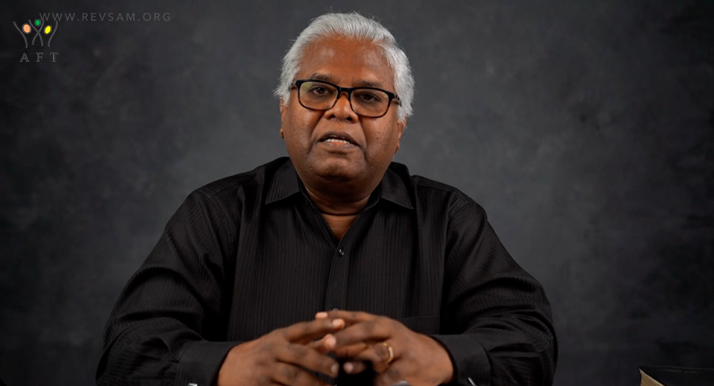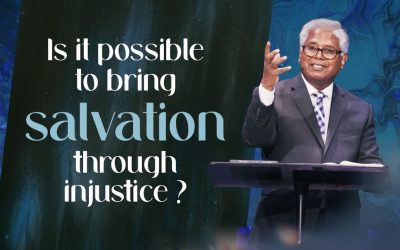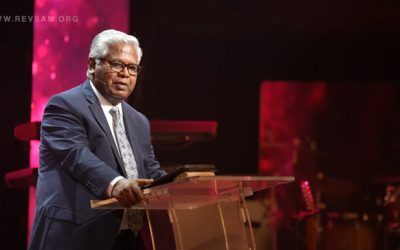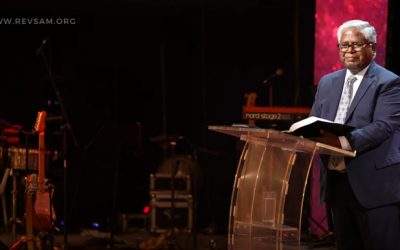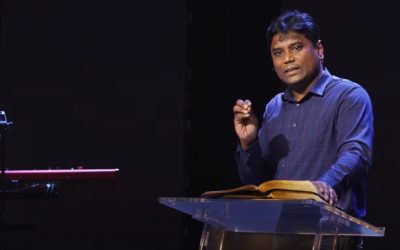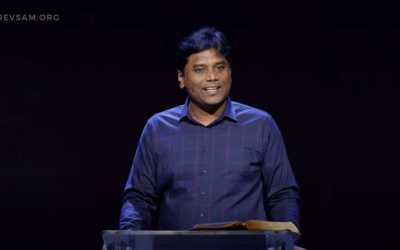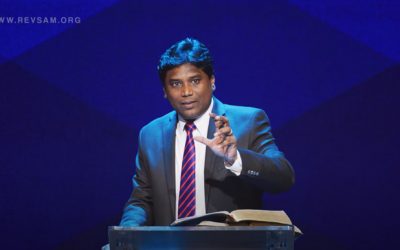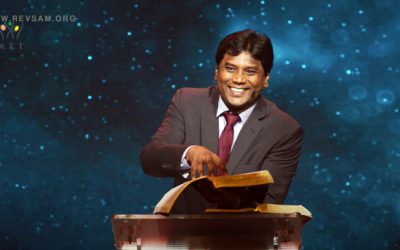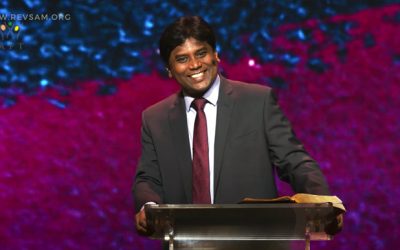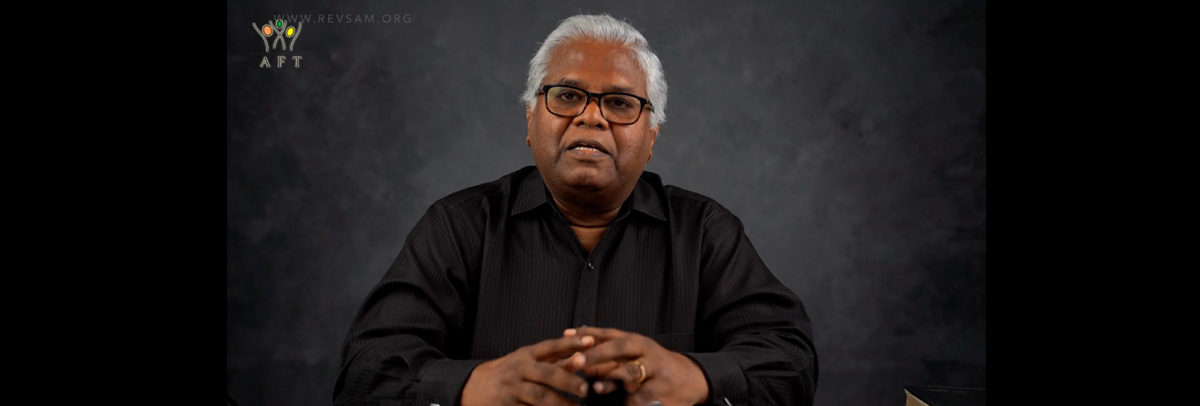
Abounding Grace (Vol 30) – The Prodigal Son’s Homecoming!
Sunday English Service – 24 JAN 21
Transcript
As you know we’ve been doing a series on the grace of God and we called this series, “Abounding Grace”. It’s about how grace abounds much more than sin, and how it abounds. Because grace abounds much more, it means that whatever havoc, whatever damage sin has caused in a person’s life, grace is able to more than make up for it. It is able to rectify, remedy, and make everything beautiful and wonderful when it enters into people’s lives at salvation and thereafter, and works on people and changes them.
So, we’ve been looking at this and we went to a lot of places and finally came to Luke, chapter 15 and that’s where we’ve been for many weeks now. Luke chapter 15, we have Jesus telling us three wonderful parables of grace. And in these parables of grace, we’ve been looking at how grace changes people’s lives; how it changes, even our relationship with each other, and most importantly, we’ve also been looking at how it forms a new kind of human community and unique human society, called the Church of the Lord Jesus Christ. A new kind of communities formed, that you may call a Grace Community. That is why in the world, a lot of churches are named the ‘Grace Community Church’ and so on. It’s a very popular name because the church is a grace community. It consists of people that have experienced the power of God’s grace in their lives. They’ve been sinners; they’ve been lost and now they have been found and they have been changed by the powerful grace of God. What sin has done, has been more than made up by the grace of God; the grace of God has done much more for them, than what sin could damage, so that their life has made beautiful and wonderful, and the church consists of such people. So, we’ve been looking at that and today, we’re going to look at something more today from the Parable of the Prodigal Son, which we’ve been at for last several weeks. We’ve been looking at the Parable of the Prodigal Son.
We looked at repentance, for example, which is a major theme in that parable. But the wonderful thing is, Jesus brilliantly brings our attention to one of the major themes of the Bible in this parable and that theme is the theme of exile and homecoming. And do you know what exile is? To be exiled is to be evicted, banished, expelled, banned, from the place of your origin or your native place or native lands, the place where you belong. Therefore, people that have been in exile, that have been exiled, they feel alienated; they feel separated from where they belong, from where they should be. And wherever they are, they’ll feel like they’re not at home at all. And they feel like they are in exile. And that’s how today, human beings feel, because we have been exiled from the place where originally God put us from the condition in which originally God put us. God has intended for us a totally different kind of life, a different kind of existence. And we have come now far removed from that. We’ve come away from that just like the prodigal son left his home and went to a distant far country, so that he can do whatever he liked. We have come far away from God, distanced ourselves from God. We have all been exiled, so to speak. And therefore, human beings have one problem, and that is, they live in this world and they are not able to feel at home in this world. They always feel that they’re not really home in this world. They feel that this world is not able to meet their deepest desires. They feel the world as it is, is not the kind of life that God intended for them; that the world has changed from what God made it to be; what God intended it to be; that it’s become a different kind of world today, so that people feel alienated. People feel like they’re lost; people feel like they’ve come away from the original plan, purpose and original position and place in which they were placed by God. So, we’re going to talk about that today: the exile and homecoming. Homecoming is where you return to the original place, the place where you belong, really. The place which you will call your home. So, we’re going to talk about that. We’re going to talk about why human beings feel that way and what God has got as a solution for it. So, we’re going to talk about it in terms of three things. One is the human condition. The human condition where we feel exiled; we feel alienated; we feel that we are not at home. That’s the human condition. Then we’re going to talk about God’s solution to this human condition, the problem. And then thirdly, we’re going to talk about the new communion, new relationship, and new intimacy that we have now with God. We’ve found our home and we have found a new kind of relationship and intimacy and that’s what the Christian life is all about. So, we’re going to talk about these three things: the human condition; God’s solution; and the new community or new communion that we have with God, where we feel at home. So, we’re going to talk about these three things.
Let’s talk about the human condition first. I told you that the main theme of the Bible is exile and homecoming. The Book of Genesis tells us about our origin; where we all come from; our original home. We were made for the garden of God. That was home for us. Home is a place that fits you and suits you best. That’s what you call home. It’s a place where you can be your true self. In the garden of God, there was everything that your heart would ever long for. For example, you had work there, which satisfied your creative capacities. In the garden of God, there was counsel of God – God’s wisdom and knowledge available to you. He counselled, which satisfied your greatest aspirations of your mind. And then in the garden of God, there was the love of God, which satisfied the need for love and affirmation. We need to be loved; we are love creatures. We were made by God, who is love and meant to live in love, just like fish lives in water; we need to live in love, surrounded by love, constantly receiving the assurance that we are loved.
So, we had that in the Garden of Eden. In our place of origin, all the things were there. We were at home. But the Bible says that something very sad happened there. What happened there? Exactly the same thing that happened to this young man, happened to all of us, collectively as the human race, in the Garden of Eden. What happened? Somehow, the first man and the woman were vexed under God’s authority. Somehow, they came to the conclusion that they didn’t want to live under God’s authority. Why should we live under God’s authority? Like this young man, they decided that they’d like to go somewhere and live their own life. They don’t like any control. After all, God forbade only one thing: He said, “Don’t eat of this particular tree – the tree is the knowledge of good and evil”. That’s the only thing they were told not to do, and they felt that it’s too much restriction, and they wanted to get away from under the authority of God. They felt like they’re somewhat reduced by that restriction, so they wanted to get away from it. So, they were dissatisfied, vexed under God’s authority; the Father’s authority. And they wanted to live their own lives, in the way they wanted to live it; do whatever they wanted. They didn’t want a God over themselves. They’ll be their own God; that’s what they decided, and that resulted in them being alienated from their Father, who brought them into being and gave them everything, there in the garden. So, that’s how we lost our home. We started there and we had to get out of there and we lost our home. We were exiled and that led to us being in want; that led to hunger; that led to insufficiency; that lead to all kinds of evil coming into our life, just like it happened to the younger son, who went away to a distant land and spent all his money and ended up in the hunger, not having anything to eat; reduced to nothing, like a beggar. That is the way the entire human race has walked away from under the authority of God and as a result, have brought into their life all kinds of evil and suffer today, under all of that. So, everybody in this human race, in a way, is a ‘prodigal’, really.
This story of the prodigal son is about every one of us, literally. It’s like when you read this, it’s a very powerful story and you feel like Jesus is pointing His finger at the entire human race and saying, “Hey! This is about you. This is about every single one of you”. We’re all the prodigal son. We’re all wandering in the world and we’re all living a life in which our deepest longings and needs are not met and we are not satisfied. We are all exiles, and we are not truly happy in this world. We are all alienated from our homes, from our authentic self. We are ourselves anymore; not our true self, anymore. Now, that is a big thing to think about. Do you remember the great animated movie, The Lion King, that came a few years ago, it became very popular? Early on in the movie, there’s a lovely, wonderful song called, ‘The Circle of Life’. The song simply says that we’re all part of the circle of life. Everybody’s happy about it; everybody’s saying, “Ah, the circle of life”. And at first, you don’t know what the circle of life is all about. A little later on the father lion talks to the son lion, the young lion. And he says something about the fact that we are all part of the circle of life. And the younger lion says, “But dad, don’t we eat the antelopes?” So, the son says, “What do you mean by the circle of life? It’s actually a pyramid, isn’t it because we eat antelopes?” The father Lion says, “Oh no, you don’t understand. Yes, we eat the antelope but then we die. And when we die, we fertilize the grass. Because we fertilize the grass and the grass grows up and then the antelopes eat the grass. See, we come a full circle. This is the circle of life. First, we eat the antelopes, then the antelope eats us. We’re all part of that wonderful circle of life”. Isn’t that something? If you want to sing about something like this, is it something to sing about, and rejoice about? A world in which everyone you love becomes fertilizer and then you yourself become fertilizer later on, is not a world that our hearts can rest in and be happy in. Not at all, a world in which we can be at rest.
So, you understand why we say we are exiles? This is not the kind of existence, this is not the kind of life, that we were built for, that we were made for. See, for some people they don’t think very much, but the person who likes to dig into ideas and think about things, think about life deeply, realizes there is something seriously wrong. See, if you’re willing to think about it and if you think about it, I’m sure you’ll find that you’re profoundly alienated – absolutely alienated. Now, why do we feel alienated? See, the fish don’t complain about being wet. They’re wet all the time. They don’t complain about being wet because they are meant to live in water. That’s their life. They’re meant to exist in water. Therefore, they don’t complain. And if, as some people say, that we are the product of a material universe; that we’ve just materials beings, why don’t we feel at home here then? We should be able to feel perfectly at home, in a material world, if you are just material being. Why are you not feeling at home? Why is this dissatisfaction? Why is this unhappiness? Why is this longing for a home, that we feel that we are made for? Sometimes, going back to our roots, going back to some good home, where we lived, or town where we live, city where we lived, our country where we lived, makes us feel like we have come home. It gives us a temporary feeling of how we are home.
I know personally, a person who was given up by doctors, because of a sudden illness he had. The doctor said that his life is going to come to an end and he knew it very well. He went back to the country and the city from where he originally was. He was living in another country. When he went there, he got one of his friends, been a long-time friend of his. They went to a few places and then finally stopped at the school where he studied many years ago – maybe about more than 30 years ago – and told this friend to wait over there and there was no one in school. He got into the school and didn’t come out for a few minutes, and the friend was wondering what happened. So, he went in to look and he found him, sitting in a classroom in one of the seats, where the students sit. Finally, he went and asked him what was happening. This guy seemed to be in deep thought, sitting there, thinking about something. And he woke up from that and told his friend, “No, I used to sit here at this exact same place, when I was going to school here”. And the friend didn’t know that he was going to die. The friend didn’t know that he was in a dying condition; that he had an illness. He thought he was just reminiscing about his old days. So, they came home and finally in a few months, he died. Then only this friend came to know, that’s the reason he went and sat there. Why did he go and sit there? What was he seeking? He was burdened with the thought of this disease, that was going to take his life. He was burdened about the fact that his life was going to come to an end; burdened with so many challenges that it presented, things that he could do nothing about. And he wanted to go back to the place, where in his younger days, he was totally worry-free. He didn’t worry about anything; everything was provided for. He had ultimate fun in that school. Enjoyed being there; had a lot of friends. So, he wanted to go there and get that feel one more time – burden-free, worry-free life that he enjoyed. He wanted to go back to it; he was seeking to go back to it; seeking to get a feel of it. He knows that, that’s what life is about.
Life is about being free from worries, free from fear, free from debt, free from worry and tears, and all of these things. That’s what life is about. So, he wanted to somehow get back to that condition. I think in his heart, he probably wanted to just feel that feeling of being without any worry, without any fear, without any concern about things in life. He wanted to get back into that young life that he enjoyed at one time. But the thing is, one could never go back to the place where he really came from – that home, that I’m talking about. Sometimes we go seeking like this, you know, we go seeking to our original, native place or some home that we lived in, and there is some longing for it and we feel kind of at home there when we go and see, for a moment. but it’s not there. You could never get back to that same condition, same place where you were. But there is a strange remembrance of where we are originally from, even though we’ve never been in the Garden of Eden. We were just born recently and we’ve lived only for a few years. No way we were there, 1000s of years ago, but we remember the garden, somehow. We remember what life was like, under the protection and the provision of God; under the care of our Heavenly Father. We remember what life was like in that beautiful atmosphere; in that beautiful garden which God Himself made. We remember what life was like in that atmosphere of God’s love, that surrounded us. Somehow in our heart, there is a remembrance. There is a strange remembrance. We remember the creative opportunities that were available for us. We remember the knowledge and the wisdom, that made that home, a wonderful home. We remember a time when there was no debt, no pain, no sickness, no poverty, no fear. We remember that place of perfection and beauty. Don’t we remember? Somewhere, in the depth of our heart, we have this memory. We remember it, yet we don’t remember it. That’s the way I can say it. We really weren’t there because we are not that old. We just been alive for so many years, and yet we know that homesickness that I’m talking about. We know that this is not the kind of world that we weren’t made for. We were made for that kind of world which exists in our remembrance, deep down in our hearts. We know somehow that we are not home. And that is the human condition. That is the condition in which every human being lives in this world today, knowing that we are not at home. Our home is some other place that we have been exiled. We have come away from that. We are living a life that is much different from what was originally intended. And this story evokes this whole thought, wonderfully.
Secondly, let’s talk about God’s solution. What is God’s solution for this homesickness, for this problem, this human condition? What is God’s solution? The story explains what God’s solution is. See, one of the controversial things about this parable, is that this parable, in which the father represents God, and the son (the younger son), represents the returning sinner. The returning sinner is allowed to return and is received by the Father, strangely, without making any atonement, without any sacrifice, without paying for his sins, without any of those things; simply received. He comes and the father simply receives him. No atonement, no sacrifice; seems like there’s no accountability for what he has done. No suffering; he undergoes no suffering. In fact, he says, “Give me a job as one of the hired servants. I’ll work and pay back everything that I lost”. The father is not willing. The father straight away, hurriedly and willingly, accepts him as a son; puts the robe on him, puts the ring on him – a sign of the family authority – and puts the sandals on him. It shows that he’s not a slave. Only slaves go by without a sandal. That he’s a son and approves him as a son and receives him as a son, instantly, just like that. This, many people have questioned. What is this? What does it tell us about salvation? Many people say, well, historically, Christianity has always said that Jesus had to die on the cross and pay the price and take our penalty upon Himself, the punishment upon himself, not only our sin, He carried; the punishment of our sin, was carried by Him. This is what Christianity has preached and believed in, historically. So, they say, “How can this be?” So, Jesus had to die on the cross, we preach. But in this story, it is not there. That is a grievance many people have about this story. Some people have read this passage, and they’ve said, “Wait a minute. You guys are preaching about Jesus dying on a cross, carrying our sin and our punishment and everything; paying the price, but it looks like there is no such thing”. And this story tells us nothing about that. The father, who represents God in this story; he’s accepting the son, who represents the repentant sinner, simply like that. He does not even want any payment, even when it is offered. Why are you guys preaching about payment? Why are you guys preaching about the wages of sin, which is death? Why are you preaching about the cross and Jesus dying on the cross, to satisfy God’s justice? Why are you preaching about atonement? Why is there a need for sacrifice? Why should Jesus be the Lamb of God for us? If you read this story in that way, you’re completely wrong. And you’re completely missing one of the most wonderful things you will find anywhere in the Bible. Let me show it to you.
If you go to the beginning of Luke chapter 15, where we find the story of the prodigal son gives, it gives you the context, right. I’ve mentioned that several times. The first two verses, where we see the tax collectors and sinners, on the one hand – the younger brother types – they are gathered there to hear Jesus teach. And then you see the older brother types – the Pharisees and the Scribes, were also there. The older brother types are complaining about the younger brother types, the sinners. They’re complaining about Jesus, saying, “How can He be so comfortable with these sinners? How can He get along with them so well? How can He allow them to be a part of this spiritual community, to come and hear the teachings, and to stay in the front seat?” In response to their murmur and their complaint, Jesus gives these three parables, right.
The first is a Parable of the Lost Sheep, where a shepherd has 100 sheep, and one is lost. He leaves the 99 and goes after 1. So, you have a sheep that is lost, and the shepherd going after it, looking for it, searching and finding it, and putting it on its shoulder happily, returning home and rejoicing and calling everybody to the party, saying, “Come and rejoice with me; I have found the sheep. It was lost and is found. Come on. Let’s have a party”.
The second parable is about the Lost Coin, where a woman who has 10 coins, loses one coin. It’s about one day’s wage, probably. And sweeps the whole house, turns it upside down, looking for that one coin and finally finds it, and she’s so happy about finding it, rejoices over it because everybody. They have a party. She’s welcoming everybody to come and rejoice with her because she’s found the lost coin.
The third parable is the Parable of the Lost Son. A son is lost son. The son is more valuable than the sheep and the coin. A son is lost in a family. A family as a son who is lost. Yet no one seems to go out. For the sheep, the shepherd went out, searched everywhere, found and came rejoicing; invited everybody. For the coin, the woman went and swept the whole house; called everybody. They were rejoicing. But for the son, nobody goes out. Very striking. If you read chapter 15, in one sitting, all the three parables together, in the context, it will sound very striking if you read it like that because in the first two parables, the seeking and finding happens. It the third parable, there is no seeking and finding. Why is the story going like that? Jesus, I believe deliberately does that to force us to ask a question. What question? The question of who should have gone out after the son. Who should have gone out? In that culture, if you went and asked that question – who should have gone out – they would easily tell you, that it is the older brother’s job to go out and look for this son that is lost because the older brother had a very special place in the family. He is the one that is supposed to keep the family together. He has the great responsibility of keeping the family, a family. That is why most of the wealth is given to him. That is why he gets the double share, more than others, being the eldest son, because he’s got this great responsibility of keeping the family together, intact and the wealth of the family together, and passing it on to the next generation and so on. So, the older brother has a real responsibility in that culture, in that society; that’s the way it was. So, anybody would have said, the older brother should have gone out.
See, there is a true story about a young soldier, who was missing in action during the Vietnam War. See, America was involved in a war in Vietnam for many years, and a lot of American soldiers died in that war. And during this time, there was a young man in his 20’s, who was fighting on the American side (an American), who was lost in action. He went out in a plane, and didn’t come back. He was lost in action. Nobody knew what happened to him. His family was grieved, and they hoped to get him back, and nothing happened. And after exhausting all the options of going through the official channels possible to find out what happened to the son, they weren’t able to find anything. Finally, the older son could not take it because, seven years before this happened on the exact same day, the father was lost. He was a merchant navy captain. He was lost in the sea, never found. So, in this family, this is happening the second time; it’s happening, seven years later, with this son. So, the brother couldn’t take it, so he went out. He went out into the jungles of Vietnam, to look for him. He went out where they were fighting; the two armies were fighting and he was risking his life. He was in extreme danger. He was right there, in the battlefield, in the jungle. He could be imprisoned by the enemy army. Yet, the story says he survived. There’s a book that has come out, written by this brother who went out looking for his brother, called ‘The Pilot’s Brother’, I think. The thing is, in the midst of the jungle, and in the midst of all the battle that was going on, this man was never touched. He’s survived. Do you know why?
Both sides that were fighting, were in awe and filled with respect for this man’s quest; search for his brother. They were awed at the love he had for the brother and the dedication he showed, in searching for him; risking his whole life. He didn’t care about what happened to him; went out in the jungle, searching for him, with such dedication and many of the people out there fighting, simply called him, ‘The Brother’. He was known as the brother. That’s the way a brother should be. That’s what they’re saying, really. That’s what a true brother would have done. That’s what a true brother should have done. A true elder brother, in this family, in this story, a true older brother, would have gone to the father and said, well, his younger brother is a fool. He’s gone and made a mess of his life; wasted all his money. I’ll go find him, at whatever expense. I will spend what I have, to find him, get him back and restore him back to the family. I will bring him back at my own expense. That’s what a true elder brother would say. See, at the very end of the story, at the very end of the story, it talks about the elder brother. Right. And the father, goes out to the elder brother, who’s angry and refused to come into the party that was happening, after the younger brother came back.
After the younger brother returned, they were having a party, in celebration of his return. The father has killed a fatted calf and they were feasting. The elder brother heard about it, heard about the music and the dancing going on and the celebration going on and he didn’t want to come in. He was literally fighting with his father, saying, “Look! All these years I’ve been slaving for you never disobeyed your orders. Yet, you never gave me even a young goat so I could celebrate with my friends” – that’s verse 29. Verse 30: “But when this son of yours who has squandered your property with prostitutes comes home, you kill the fattened calf for him!’”. And look at the answer, the father gives to the elder brother. He says, “‘My son,’ the father said, ‘you are always with me”. The guy says, “You’ve never had a celebration for me”. The father says, “Why should I have a celebration for you? You’re already there; you’re always with me. You’re always with me and everything I have is yours. What more celebration do you want? You own everything that I have. “But we had to celebrate and be glad, because this brother of yours was dead and is alive again; he was lost and is found.’”. But look at how he says it, in verse 32, “But we had to celebrate and be glad.” “We had to celebrate, and be glad”, he says, “Because this younger brother of yours was dead and is alive again”. This is serious business. You’re alright, you’re fine with me, you have everything, all the property that we have, every asset we have, is yours. It’s celebration 24 hours, really. Everything is enjoyed by you, but this fella went and wasted his life became nothing. He was dead; dead to the family; debt to the community; dead, dead in every way. Now, he’s restored, he’s come back, he’s alive again. “We had to celebrate”. I like the way he says that: “We had to celebrate”. “Had to celebrate”. You see, there’s a lot of truth in what the father said to the oldest son. He said, “Everything I have is yours”. He was telling a little truth. Do you know why? Because the father had divided up the property, gave the younger son his share and the oldest son, is double share. He divided up his property already. Right. What it means now is that, that every single thing that the father owns is now the elder brother’s asset. It’s all his. He’s the only heir left. Every robe, every ring, every sandal, every fatted calf, belongs to him. Therefore, that means that there is no way for the father to bring the younger son back but at the expense of the elder brother. The restoration of the younger son was free to him. It was all grace but it was not free, to the elder brother. It was at the enormous expense of the elder brother. Now he’s got to share his property with the younger brother. There’s no way for the father to bring the younger brother back in the family, except at the expense of the elder brother.
See, in this story, the elder brother is a terrible elder brother. Jesus put this elder brother in the story to show what the Pharisees looked like. He wanted to put the mirror before them, so that they can see themselves. That is why He got the elder brother like this, in this story. But our elder brother is not like that. You listen to me. Our elder brother is not like that. If we are the prodigal son, we collectively as the human raise, all human beings, if we have the prodigal son, we need a true elder brother. There is no way for our Father, our God, to bring us back to the family to the family, to readopt us, to bring us back in, to accept us, to clothe us, to give us the honor of being a son, except at the expense of a true elder brother. What kind of elder brother would we need? We would need one that didn’t just come from America to Vietnam to find his brother. We would need someone, who would come all the way from Heaven to earth. All the way from Heaven to earth. We wouldn’t just simply need an elder brother who’d just pay a finite amount of money to restore us but someone who was willing to take upon himself, our infinite debt. Pay with His very life, the price. Therefore, we have a wonderful elder brother. Our elder brother is not like this elder brother in this story. The One who’s telling the story is our elder brother. We have him in Jesus Christ. He was stripped naked on the cross of Calvary. He was stripped naked because we can be clothed with a robe of dignity and have the position as sons.
Jesus Christ, our elder brother, drank that cup of eternal justice. Remember, in the Garden of Gethsemane, He cried out to the Father saying, “Father, let this cup pass from me, if possible”. Then He said, “Nevertheless not my will but your will be done”. He drank the cup of eternal justice, so we could receive that cup of festival joy; so, we can sit in the feast and eat and drink. He took the cup of suffering. We have a perfect elder brother. We have a true elder brother. It’s Jesus Christ. The Father couldn’t bring any of us back in, except at the expense of the older brother. He became therefore an exile for us. He was literally exiled for us. That’s why we have Jesus saying, “Foxes have holes and birds of the air have nests, but the Son of Man has nowhere to lay His head.” He was a wanderer; He wandered in the wilderness. He was crucified outside the gate, like the sacrificial scapegoat, which was taken out in the wilderness outside. When He died, He said, “My God, my God, why have thou forsaken me?” See, that’s the exile. He was forsaken, He was an outcast. He was taken outside the gate and was crucified. He experienced the ultimate exile. He had to come from Heaven, down to earth. Why? So that He could bring us, His prodigal brothers and sisters, home. To bring us home, to open the way for us to come back home, so that we can come back home to the Father’s house.
Now, just imagine what kind of difference this will make in our life, when we realize this. See, this is the solution for homesickness, for all of us who are homesick, for all of us who know that there is a real home from which we really come. That’s the real home, where things are different. We know it in our heart; we’ve been searching for it. We’ve been longing for it and here is the solution. Here is the way to get back, and what difference will it make in this life, when you realize this?
What will happen when you go for a family reunion? Have you been to a family reunion, where the family is now scattered? People live everywhere now. These days people live all over the world, right. And say for example, you have a family reunion and everybody comes from everywhere, all brothers and sisters are joined together and you have a great big family reunion. What happens there? I’ll tell you what the main thing will be. The main this will be food. That’s what happens there. That’s the main way to have a family reunion – you eat. There is no homecoming, without food. In ancient times, it was even more so. The evening meal was the very centre of the family and community life there. It was the very centre. It lasted all evening. Once it got dark, you sat down to eat and you ate, until you went to bed. It was long protracted thing. Do you know why? The family meal was a symbol of something. It spoke of a healthy family. It spoke of a human community. It spoke about intimate flourishing and was a symbol of that. The family meal is where you really feel at home. Your body is getting the food that it needs – great food, but then your soul, your heart, is also getting laughter, relationship and intimacy. The feasting amounts to being a place of physical, emotional, and spiritual and relational flourishing. So, when you’re at a family reunion like that, no matter what else is wrong with you, for that moment, at least, for that few minutes at least, you feel like you’re really home. You’re where you belong. Right. And the Bible says that because of the work of our true elder brother, Jesus Christ, the world is going to be home again. We’re going to live in a world, which would be like the original home that God intended. He’s going wipe away death; He’s going to wipe away all suffering; He’s going to wipe away tears. He’s going to give us bodies that will run and never be weary. He’s going to give us love, where there will be no parting; nobody dying and leaving us. It’s going to be the ultimate feast. That’s what we’re going to have in the future – the ultimate homecoming feast.
Let me read to you just a few verses, here and there, from Isaiah 25. On this mountain the Lord Almighty will prepare a feast of rich food for all peoples, a banquet of aged wine – the best of meats and the finest of wines. On this mountain He will destroy the shroud that enfolds all peoples, He will swallow up death forever. The Sovereign Lord will wipe away the tears from all faces; He will remove his people’s disgrace from all the earth.
Matthew 19 again, Jesus says, “I tell you the truth, at the renewal of all things, when the Son of Man sits on his glorious throne, you who have followed me will also sit on twelve thrones”.
And Matthew 8:11, Jesus again says, “I say to you that many will come from the east and the west, and will take their places at the feast with Abraham, Isaac and Jacob in the kingdom of Heaven”. That’s our future, my friend. That’s the feast that we’re going to be part of. That’s the greatest time of fellowship. And that’s where we’re going to feel at home. That’s our future, when Jesus Christ comes back. That’s where you’ll find the Father fall on your neck and kiss you. That’s where you will find our elder brother, Jesus Christ, open the door for us, to enter into that feast and be a part of the feast. That’s the future.
But what about the present? What kind of people would you and I be, if we could almost taste that now, if we could have a foretaste of that now? Is it possible to have a foretaste of that now? Is it possible to feel the Father embracing us, the Father kissing us? Is it possible to feel that we are part of the feast, where every desire of our hearts will be fulfilled as satisfied? If we could experience that, somehow already now, in the present, instead of just waiting for the future. If we can experience that now, what would we be like? I’ll tell you. We’d always have quiet confidence. We will never freak out over anything. It will drive fear out; it’ll bring us great hope, because we know where we are headed, we know what we are a part off. If we can experience that, that which is going to happen in some way now, as the present reality. Can that happen? Can we experience that as a present reality now? Is there any way to experience that as the present reality now? Yes. I don’t know if you ever thought about this. It is possible to experience that. And that is why the Lord Jesus Christ has given us what is called the ‘Lord’s Supper’. And in observing that, Jesus said, “Do this in remembrance of Me”. Remember that? That’s the only thing He said about it – “Do this in remembrance of Me”. In other words, He means, that this represents everything that I have done for you and everything that I will ever do for you. Do this as a way of thinking about everything that I have done for you. Do this as a way of re-energizing your understanding about salvation and what I’ve done. Do this as a way of reconnecting to the wonderful life-changing effects of the Father’s welcome and your homecoming. The Lord’s Supper represents, in some way, the experience of the father’s welcome in this story, where the father runs and comes and has compassion. Hugs and kisses and welcomes him and receives him as a son and when the son has finally come home. His homecoming, the father’s welcome and the homecoming. The Lord’s Supper represents that. The Lord Jesus gave us this for a purpose. It’s not just a ritual. It’s a ritual with heavy meaning. It is so that we can experience in this present life, the life changing experience and effects of the Father’s welcome and our homecoming. It is an opportunity. The Lord’s Supper in which we participate, is an opportunity given to us to experience not only the Father’s welcome and the homecoming; to experience the work of our true elder brother, who has come into our lives, and has done great things for us and made this possible for us, at His expense.
He does two things – the Lord’s Supper, does two things: One is, it’s a time of intimacy with Christ. It brings us very close to Christ, to experience Christ in a real way. What does the Father say at the end? I read to you the last verse in 15th chapter of Luke. It says, “We had to celebrate”. Or we have to celebrate, we can say it like that. Why? Why do we have to celebrate? Because he says, “My son, this son was dead and is now alive again”, he says. “That’s why we have to celebrate”, he says. Guess what? The ultimate son, who was exiled on our behalf, for us, who took our sin, carried our penalty and paid the price, the greatest price that could ever be paid, for our sin, that son, who died, is alive again. And Jesus says, that’s what the Lord’s Supper is all about. The word ‘remember’, is a very strong word. It’s not like the English word in other words, remember, is a very strong word. It’s not just thinking and remembering about something; it is really saying, if you want to have fellowship with me, if you want to experience me, if you want to remember me in that way, in an experiential way, if you want to connect to me, if you want to link up with me, want to hook up with me, want to experience me in a real way in your life; eat in faith, drink in faith.
See, that’s what the Holy Communion means, because Jesus, our Lord Himself, is present in it. He is Himself there. When we eat and drink in faith, you can’t see Him with your eyes, but He is present. He is there. And you are having an intimate connection with Him, which is not available in any other way. That’s one thing – brings you an intimacy with Jesus Christ. When He says, “Do this in remembrance of me”, He says, “Do this in order to connect with me, link up with me, let me change you, let me transform you. Let me bring you to this new life and all that it entails”. Right.
Secondly, the very form of the Lord’s Supper tells us something. What is the form of the Lord’s Supper? See, when you have a feast, you don’t cook and eat by yourself. You don’t cook a feast of biryani and sit there and eat yourself. When you have a feast, the very word, ‘feast’, involves a lot of people coming in, and we have a feast. Right. So, it’s not like sitting and eating by yourself. It’s a communal thing. It is a community thing. It is a community event. We don’t go off in a corner and do it by ourselves. That’s not a feast. You can do that but that’s not a feast. You can’t have a feast by yourself. So, the very form, the way in which it is done, coming together as a community, as the church, and participating in the communion, tells us something. He’s forcing us to see, that if you want to have union with Him and be linked with Jesus Christ and if you want to have the life changing effects of the Father’s welcome and our homecoming into your life now, if you want the Father’s Welcome to really make a difference in your life now, if you want the homecoming to really make a difference in your life now, you must receive it as a community. It must be a shared experience. You have to do it together. In the strongest way, Jesus is saying, if you want to really be shaped by my salvation, you have to share life together.
See, the salvation is where Jesus comes and forgives your sin and brings you back to God and so on, then you’re formed and shaped as a result of you belonging to a community. You’re formed and shaped into a wonderful person, as a result of your joining this community. The Lord’s Supper is telling us that we have to eat together, we have to talk together, we have to confess our sins together. We have to learn together, study together and so on. We do things together. We are a community. You cannot be changed, except by belonging to a community, a group of believers and be shaped by that. Belonging to that family, literally being in the presence of the family members, you imbibe the qualities of the family. That’s the reason we all have to belong to a community, in which we immerse ourselves. We become a part of that. We feel a part of that and we develop from there. That’s what the Lord’s Supper is all about. So, the community is so important. It is shared life. The Lord’s Supper speaks of a shared life. It’s experiencing Christ together, knowing Christ together, getting together and being transformed by the coming together.
And finally, the new communion. The result of the solution that God brings to the human condition, which is homesickness. The result is a new communion, new closeness and relationship, intimacy with God Himself, through Jesus Christ. It is possible to have a wonderful, dramatic and even emotional experience, in coming to Christ. And yet, not really change in your life because you refuse to give yourself to belong to a Christian community. Jesus says there’s a value of being in a community, a group of believers. So, when you think the Lord’s Supper, you’re giving yourself to that community and you’re going to be formed and shaped, knowing you belong to a family. And you’re going to develop a particular way, as the result of belonging to that family. You’re going to become a certain kind of person, as a result of belonging to that community. So, it’s important that you realize the solution that God has provided for the human problem, which is homesickness, alienation, exile, being in exile. He has brought us back to Himself, through His Son, Jesus Christ. And by bringing us to Himself, He has brought us home, really. We are home, finally. If you know God, that means you’re home. That’s where your shelter is, that is where you find the greatest satisfaction, that’s what meets your needs. God is the greatest thing in your life right now.
Let me give you a little example of how there is a difference between a home and other things. There are other places we enjoy going to and have fun. Sometimes going to those places, for example, a park. There are some wonderful parks, here in our city itself, but around the world, if you go, there are major cities, in which they sometimes put a park that extends for miles together. You’ll find people running, walking, and some excellent musicians come there display their talents, singing there. And people stand around watching, some people will be playing chess there. There will be tables there, kept just for playing chess and people stand around, watching people playing chess and there’ll be other comedians doing stand-up comedy there, for people to enjoy. There’ll be roller skating tricks, that are done by experts in roller skating and all that. And people will be displaying various kinds of talents and people will be just walking around, enjoying themselves, eating some snacks and just walking around, having a stroll or sitting there and talking, meeting with friends and so on. Having a wonderful time. A park is a wonderful place to go. The environment is beautiful and wonderful. It’s wonderful to go there for one or two hours, but they are not places, where people can live for 24 hours a day. They are not meant to be like that. Just imagine what would happen if everybody turns that park into their home. Just imagine what will happen if they start cooking there, washing there, bathing there, sleeping there, doing everything there. That place would not be a place that you’d like to go to. It’s a park. Everybody comes and enjoys the facilities given there, and they go home. Home is the thing that you go to from wherever you go, you come back to the home. See, we need to understand that. So, we go to work. Some of us enjoy work but that’s not home. Some of us enjoy our career. Some of us enjoy our business. We go to it, we enjoy it. We get involved in it. We take pleasure in it. That’s fine. Enjoy yourself. There’s nothing wrong in enjoying that, but that’s not home. You know what is home? Nothing in this world is a home. Not your career. Not even your family, it’s not even your profession. It is not this and that. Whatever it is, if it is not God. It’s only a park. God is your home. God is where you belong. Other places could not bear the full weight of your soul.
Like I said, you can’t go to the park and make that your home. The park is not equipped to be home. It can’t be your home, it can’t serve you in that way, it can’t satisfy your need in that way. A home is a different thing. And there’s nothing in the world that can satisfy you, like God. God is your home. And if you try to make other things your home, other things that cannot bear the full weight of your soul, you try to make other things your home. Whatever it is, they may be good things but if you try to make them your home, then, you know what will happen? You’ll be like Cain. You’ll be a wanderer, vagabond traveling and never at home. Lost, really.
We all need a home, and our home is God. Have you come home? Have you had a homecoming or are you still out there, without a home? Do you know what it means to come home? Do you know what it means to have a heavenly Father? Do you know what it means to be at home, in the place where you really belong? Where all your longings and your needs can be met. Do you know what it means to do that? I tell you today, you can come home. The Father is waiting and He will embrace, He will kiss, He will welcome, He will take you in, and the elder brother, Jesus Christ, is ready to open the door to the feast, for you. You are most welcome to come to your home, which is God, our Heavenly Father.
How to live by faith during evil times? | Habakkuk 1:1-17 | Sam P. Chelladurai | 7-Jan-23
தீமைகள் நிறைந்த சூழ்நிலைகளில் விசுவாசத்தினால் வாழுவது எப்படி? | Sam P. Chelladurai | 7-Jan-24 | AFT
தீமைகள் நிறைந்த...
தேவன் பேசியிருக்கிறார்! நீங்கள் விசுவாசிக்கிறீர்களா?
தேவன் பேசியிருக்கிறார்!...
God has spoken! Do you believe it?
God has spoken! Do you...
ஆராதனையின் புதிய ஏற்பாட்டு அடிப்படைகள்
ஆராதனையின் புதிய ஏற்பாட்டு...
New Testament basics of Worship
New Testament basics of...
இயேசுவில் உள்ள தேவ மகிமையை ருசித்துப்பாருங்கள்! (பகுதி 2)
இயேசுவில் உள்ள தேவ மகிமையை...
Taste and see God’s glory in Jesus! (Part 2)
Taste and see God's glory in...
இயேசுவில் உள்ள தேவ மகிமையை ருசித்துப்பாருங்கள்!
இயேசுவில் உள்ள தேவ மகிமையை...
Taste and see God’s glory in Jesus!
Taste and see God's glory in...


